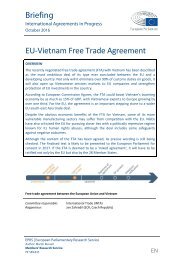A guide to EU procedures for the conclusion of international trade agreements
4bd7306n7zx
4bd7306n7zx
You also want an ePaper? Increase the reach of your titles
YUMPU automatically turns print PDFs into web optimized ePapers that Google loves.
EPRS<br />
<strong>EU</strong> <strong>procedures</strong> <strong>for</strong> <strong>conclusion</strong> <strong>of</strong> <strong>international</strong> <strong>trade</strong> <strong>agreements</strong><br />
Often <strong>for</strong>gotten but fundamental, Article 207(3) makes <strong>the</strong> Council and Commission<br />
jointly responsible <strong>for</strong> ensuring that <strong>the</strong> agreement negotiated is compatible with internal<br />
<strong>EU</strong> policies and rules.<br />
The European Parliament's role in negotiations<br />
While <strong>the</strong> European Parliament has no <strong>for</strong>mal role in starting and conducting <strong>trade</strong> negotiations,<br />
<strong>the</strong> TF<strong>EU</strong> imposes a duty <strong>of</strong> in<strong>for</strong>mation: <strong>the</strong> European Parliament must be in<strong>for</strong>med immediately<br />
and fully at all stages <strong>of</strong> <strong>the</strong> <strong>procedures</strong>. Moreover, <strong>the</strong> fact that <strong>the</strong> European Parliament has <strong>to</strong><br />
give its consent at <strong>the</strong> end <strong>of</strong> <strong>the</strong> negotiations, has made it necessary <strong>to</strong> discuss some <strong>EU</strong> positions<br />
in <strong>the</strong> negotiations with <strong>the</strong> European Parliament first, in order <strong>for</strong> <strong>the</strong> Commission <strong>to</strong> verify <strong>the</strong><br />
existence <strong>of</strong> political support. The Commission <strong>the</strong>re<strong>for</strong>e reports regularly <strong>to</strong> both <strong>the</strong> European<br />
Parliament and <strong>the</strong> TPC. While it has no legal obligation <strong>to</strong> do so, Parliament will <strong>of</strong>ten signal its<br />
political position by issuing a resolution. In <strong>the</strong> past, <strong>the</strong> European Parliament has adopted<br />
resolutions on <strong>the</strong> opening <strong>of</strong> negotiations, ei<strong>the</strong>r prior <strong>to</strong> or after <strong>the</strong> issuing <strong>of</strong> <strong>the</strong> negotiating<br />
mandate These resolutions give an initial sense <strong>of</strong> Parliament's political stance on <strong>the</strong><br />
negotiations, and set out <strong>the</strong> main concerns that Parliament wants <strong>the</strong> Commission <strong>to</strong> include or<br />
exclude from <strong>the</strong> scope <strong>of</strong> <strong>the</strong> negotiations (e.g. <strong>the</strong> resolution adopted on TTIP in 2013). EP<br />
resolutions can be issued during <strong>the</strong> negotiations in order <strong>for</strong> Parliament <strong>to</strong> give <strong>the</strong> Commission<br />
recommendations on <strong>the</strong> future development <strong>of</strong> <strong>the</strong> negotiations (e.g. <strong>the</strong> resolution adopted on<br />
TTIP in 2015). The Commission is not legally bound <strong>to</strong> follow <strong>the</strong> EP's recommendations but given<br />
that EP consent is needed <strong>to</strong> adopt <strong>the</strong> agreement, it does take <strong>the</strong>m in<strong>to</strong> account when devising<br />
<strong>the</strong> <strong>EU</strong> positions and discussing <strong>the</strong>m with <strong>the</strong> Council or <strong>the</strong> o<strong>the</strong>r party.<br />
Ex ante sustainability impact assessments during <strong>the</strong> negotiations have become <strong>the</strong> norm<br />
<strong>for</strong> all major multilateral and bilateral <strong>EU</strong> <strong>trade</strong> negotiations since 1999, when <strong>the</strong> <strong>EU</strong><br />
began incorporating <strong>the</strong> concept <strong>of</strong> sustainable development in<strong>to</strong> <strong>the</strong> definition and<br />
planning <strong>of</strong> its <strong>trade</strong> policy. Sustainability impact assessments (SIAs) comprise a<br />
consultation process and analysis by independent organisations (think -tanks or<br />
universities) <strong>to</strong> assess <strong>the</strong> potential economic, social, human rights and environmental<br />
impacts that a <strong>trade</strong> agreement could have. SIAs are carried out after <strong>the</strong> scoping<br />
exercise, as <strong>the</strong> latter defines <strong>the</strong> scope <strong>of</strong> <strong>the</strong> negotiations and will indirectly define <strong>the</strong><br />
SIA's coverage.<br />
When negotiations reach <strong>the</strong> final stage, i.e. parties have agreed in principle on a single<br />
text, <strong>the</strong> European Parliament and Council are in<strong>for</strong>med and legal scrubbing starts <strong>to</strong><br />
ensure that <strong>the</strong> text is legally coherent. Some minor changes may still occur at this stage.<br />
Once legal scrubbing is complete, <strong>the</strong> text is initialled, i.e. <strong>the</strong> chief negotia<strong>to</strong>rs from each<br />
party place <strong>the</strong>ir initials on every page <strong>of</strong> <strong>the</strong> agreement <strong>to</strong> signify that this is <strong>the</strong> agreed<br />
text. Initialling does not amount <strong>to</strong> <strong>the</strong> text being legally binding. In order <strong>to</strong> enter in<strong>to</strong><br />
<strong>for</strong>ce an agreement must be signed and ratified. To start such a procedure, <strong>the</strong> <strong>EU</strong> needs<br />
<strong>to</strong> define <strong>the</strong> legal basis <strong>for</strong> <strong>the</strong> <strong>trade</strong> agreement, which determine who has competence<br />
in <strong>the</strong> <strong>EU</strong> <strong>to</strong> ratify <strong>the</strong> treaty.<br />
Members' Research Service Page 4 <strong>of</strong> 10




